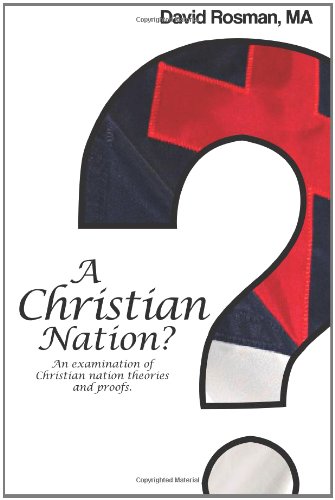Book review: A Christian Nation?
by David Rosman, MA
★★★★★
Separation of church and state in America—fact or fiction? What did our founding fathers really intend? Rosman, a “Jew by heritage, atheist by belief, and Unitarian by affiliation,” steps us through the evidence he collected from proponents of both sides of the debate. He starts out with a lengthy discussion of the “guys in wigs,” and the religious beliefs they espoused. Then he methodically considers the primary founding papers, including:
The Treaty of Tripoli
Do these documents and more betray a Christian underpinning? Or do they encourage religious tolerance? Is the constitution really based on the Ten Commandments? When did God find His way into the Star Spangled Banner, and how did “In God We Trust” turn into our national motto, even adorning our coins? Rosman’s controversial finding: We became a nation “under God” in the 1950’s, when cold war propaganda necessitated our uniting against those godless commies in the USSR.
Rosman’s analysis is very well-organized and actually quite balanced, even when he exposes America’s cold war strategy. His research leads to the expected conclusion: Our nation was NOT founded on Christian beliefs. Although a few early individuals did make efforts to merge religion and government, most of those efforts were met by reason and properly rejected.
It turns out our founding fathers shared a diverse collection of beliefs. Many were Christians, many were Deists, many were careful to give no indication. The settlers who founded our nation may have known their Bible, having come from nations where Christianity was the primary religion, but America was founded on religious freedom. We can’t describe these men in wide brushstrokes, collectively categorizing them all as Christians or Deists or Atheists. That’s as nonsensical as pretending all the writers of the New Testament were Trinitarians or Adoptionists. Different people hold different religious views—whether 2,000 years ago, 250 years ago, or today. And toleration of these differences forms the strength of our nation.
I enjoyed the book and learned a ton, but two annoyances keep me from giving it a five-star review: A bit of a slow start, and an inordinate number of editing errors. I don’t usually let errors influence my ranking, but this one definitely needed a better editor.
—
NOTE: Hooray! I just learned I was given an uncorrected draft/proof edition of the book. The binding and publication date fooled me. I can now happily upgrade my rating to five stars.












 354 Circles
354 Circles
 603 Goodreads Friends & Fans
603 Goodreads Friends & Fans

 Hello! I'm an author, historical Jesus scholar, book reviewer, and liberal Christian, which means I appreciate and attempt to exercise the humanitarian teachings of Jesus without getting hung up on any particular supernatural or religious beliefs.
The Bible is a magnificent book that has inspired and spiritually fed generations for thousands of years, and each new century seems to bring a deeper understanding of life’s purpose. This is true of not only Christianity; through the years, our age-old religions are slowly transforming from superstitious rituals into humanitarian philosophies. In short, we are growing up, and I am thrilled to be riding the wave.
I avidly read all thought-provoking religion titles. New authors: I'd love to read and review your book!
Hello! I'm an author, historical Jesus scholar, book reviewer, and liberal Christian, which means I appreciate and attempt to exercise the humanitarian teachings of Jesus without getting hung up on any particular supernatural or religious beliefs.
The Bible is a magnificent book that has inspired and spiritually fed generations for thousands of years, and each new century seems to bring a deeper understanding of life’s purpose. This is true of not only Christianity; through the years, our age-old religions are slowly transforming from superstitious rituals into humanitarian philosophies. In short, we are growing up, and I am thrilled to be riding the wave.
I avidly read all thought-provoking religion titles. New authors: I'd love to read and review your book!
 Hi! While Lee writes the articles and reviews the books, I edit, organize, and maintain the blog. The views expressed here are Lee's but I'm his biggest supporter! :-)
Hi! While Lee writes the articles and reviews the books, I edit, organize, and maintain the blog. The views expressed here are Lee's but I'm his biggest supporter! :-)
Hmm.. interesting. I should try reading about these books. Everyone has their own beliefs right? There shouldn’t be any sides to pick.
Well, life would be boring if there were no sides to pick. Thanks for commenting!
Thanks for commenting!